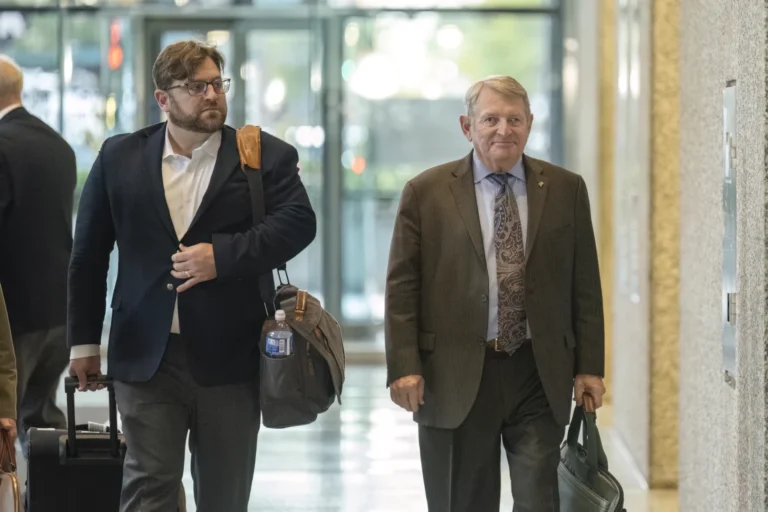The FBI “turned over heaven and earth” to find incriminating evidence against former Illinois House Speaker Michael J. Madigan but ultimately found nothing more than “legal favors,” an attorney for Madigan’s longtime friend and confidant told jurors Tuesday.
That won’t be enough to convict Michael McClain, the former lawmaker and lobbyist now on trial alongside Madigan, defense attorney John Mitchell insisted. The crucial missing piece, he said, will be any evidence of an intention to exchange a favor for something else.
“It can’t just be that there were job recommendations, and that there was legislation,” Mitchell said. “There has to be an intent to exchange those two things.”
McClain has already been convicted for a lengthy scheme to bribe Madigan to benefit ComEd. On Tuesday, he watched an attorney deliver an opening statement on his behalf all over again. This time, Mitchell defended McClain against charges revolving around ComEd, a similar plot involving AT&T Illinois, and a scheme involving a Chinatown parking lot.
The alleged Chinatown scheme also involves former Chicago Ald. Danny Solis (25th), who agreed to work for the FBI in 2016 after agents confronted him with evidence of his own alleged wrongdoing. Mitchell used his commentary to air Solis’ dirty laundry for the jury.
Through a PowerPoint slide, Mitchell told the jury that Solis “stole hundreds of thousands of dollars of campaign funds”; received bribes that included “cash, Viagra, and prostitutes”; that he lied to prosecutors, a grand jury “and his own wife and family”; and that he “now vacations to tropical islands.”
“You’ll see what a real criminal looks like,” Mitchell said. “You’ll see what a real public corruption defendant looks like. It’ll take him a week to testify about all the bribes he took.”
Solis struck a deal with prosecutors that is expected to help him avoid a conviction entirely. But he’s not the only trial witness with such an agreement. Former ComEd executive Fidel Marquez pleaded guilty to a crime but will likely avoid prison. Their deals, Mitchell said, will offer jurors an example of a “really clear, easy to understand exchange.”
Following a prosecutor’s objection, Mitchell had to clarify that Solis’ deal with the feds was not “illegal” or “unlawful.”
Madigan is accused of leading a criminal enterprise designed to enhance his political power and enrich his allies and associates. McClain is accused of acting as Madigan’s agent, passing on his instructions and shielding him from liability.
Opening statements began in the trial Monday, starting with commentary from a prosecutor and Madigan’s defense attorney. Jurors heard Mitchell’s roughly one-hour presentation as things got underway Tuesday.
When he was done, ex-state Rep. Carol Sente took the stand as the day’s first witness, giving jurors a primer of how things worked in Springfield. At one point, Madigan gave Sente a wave and a smile after she was asked to identify him in the courtroom.
Mitchell’s opening statement echoed arguments from other bribery trials revolving around McClain’s conduct, including the recent trial of ex-AT&T Illinois President Paul La Schiazza.
La Schiazza was accused of bribing Madigan by giving ex-state Rep. Edward “Eddie” Acevedo a $22,500 contract at the request of McClain, who was known in Springfield as Madigan’s messenger. Acevedo was an ally of Madigan’s.
AT&T Illinois hired Acevedo while trying to pass crucial legislation in Springfield.
La Schiazza’s trial ended with a hung jury after La Schiazza’s defense attorneys stressed the lack of evidence showing Acevedo was paid in exchange for AT&T’s legislative success.
Now Mitchell has also stressed the need for prosecutors to show an exchange.
He compared McClain’s work as a lobbyist to a salesperson who tries to build a relationship with a client over time. And when it came to the concept of a favor, he compared it to two neighbors asking to borrow someone’s snow blower — while one neighbor enjoyed a better relationship with its owner than the other.
“A favor is not, by itself, a bribe,” Mitchell said. “A favor is a favor.”
Dave McKinney contributed to this report.

